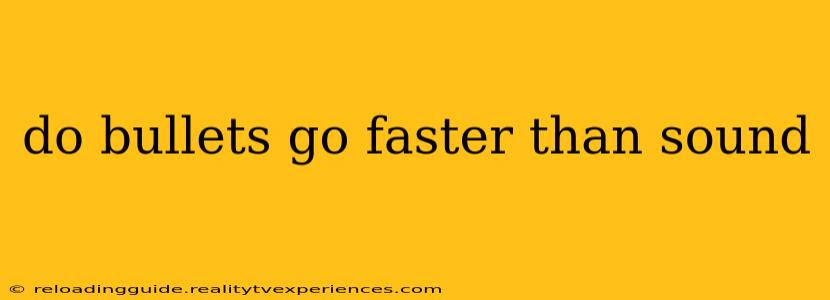Do Bullets Go Faster Than Sound? A Deep Dive into Ballistics and Supersonic Speeds
The question of whether bullets travel faster than sound is a common one, and the simple answer is: sometimes. It's not a straightforward yes or no, as the speed of a bullet depends on several factors. Let's explore the science behind bullet velocity and the fascinating world of supersonic projectiles.
Understanding the Speed of Sound
First, it's crucial to understand that the speed of sound isn't a constant. It varies depending on the medium (air, water, etc.) and its temperature, pressure, and humidity. In standard atmospheric conditions at sea level (approximately 15°C and 1 atmosphere of pressure), the speed of sound is around 767 mph (1235 km/h or 343 m/s).
Factors Affecting Bullet Velocity
Several factors determine how fast a bullet leaves the barrel of a firearm:
-
Caliber: Larger caliber bullets generally have more mass and are propelled with more force, often resulting in higher velocities. However, this isn't always the case, as bullet design plays a significant role.
-
Powder Charge: The amount of propellant (gunpowder) used directly impacts the bullet's velocity. More powder means more force, leading to a faster bullet.
-
Barrel Length: A longer barrel allows more time for the propellant to burn and accelerate the bullet, resulting in higher muzzle velocity.
-
Bullet Design: The shape and weight of the bullet significantly influence its aerodynamic properties and therefore its speed and stability in flight. A streamlined bullet will experience less air resistance and maintain its velocity longer.
-
Atmospheric Conditions: Air density and temperature affect air resistance. Thicker air at lower temperatures increases drag, slowing the bullet down.
Subsonic vs. Supersonic Bullets
Based on the factors above, bullets can be categorized as:
-
Subsonic: Bullets traveling slower than the speed of sound. These are often preferred for situations where reduced noise is crucial, such as hunting or tactical applications where noise signature is a concern.
-
Supersonic: Bullets traveling faster than the speed of sound. These bullets create a sonic boom, a characteristic loud crack or bang heard as the bullet breaks the sound barrier.
Many modern firearms, especially those designed for long-range shooting or hunting larger game, are capable of firing supersonic bullets. However, many handgun rounds and some rifle cartridges operate at subsonic speeds.
The Sonic Boom
When a bullet travels faster than sound, it creates a shock wave in the air. This shock wave is the sonic boom—a sharp, explosive sound that is a result of the sudden compression of air molecules. The intensity of the sonic boom depends on the bullet's velocity and size.
Conclusion
In short, not all bullets travel faster than sound. Whether a bullet is subsonic or supersonic depends on the specific firearm, ammunition, and environmental conditions. While many high-powered rifles and certain types of ammunition are capable of exceeding the speed of sound, many other types of bullets remain subsonic throughout their flight. Understanding these nuances is key to appreciating the complex physics involved in ballistics.

